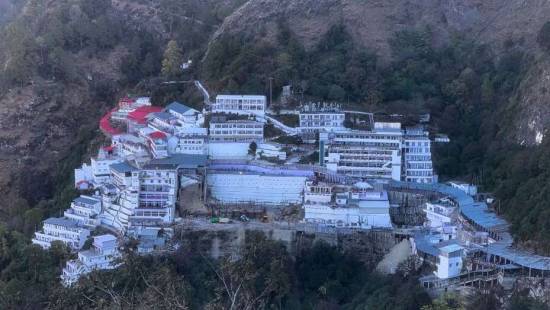At least 12 people were crushed to death and 15 others injured as tens of thousands of pilgrims gathered at a popular Hindu shrine in Indian-controlled Kashmir to offer prayers on New Year's Day, leading to a stampede, officials said.
The disaster unfolded in darkness at around 3 a.m. local time (9:30 p.m. GMT) on the packed route to the Vaishno Devi shrine in Indian-administered Kashmir, visited by millions every year as one of Hinduism's most revered sites.
"People fell over each other ... It was difficult to figure out whose leg or arms were tangled with whose," survivor Ravinder told Agence France-Presse (AFP) by phone.
"I helped pick up eight bodies by the time ambulances arrived after about half an hour. I feel lucky to be alive but am still shaking with memory of what I saw," he said.
Video footage showed terrified pilgrims clinging onto metal rafters to escape the rush and the blue lights of small minivan ambulances flashing in the darkness as they tried to rush to hospitals through huge crowds.
Officials sought to blame an alleged altercation between two groups of youths and a rush of people for New Year's Day.
"Police and officials ... were quick to respond (after the altercation), and the order within the crowd was immediately restored," local police chief Dilbag Singh told the Press Trust of India news agency.
"But by that time, the damage had been done," he said.
But witnesses said that the authorities were badly organized, something denied by the shrine's management.
Around a dozen people were also injured.
Holy sites
Millions of shrines dot Hindu-majority India's cities, towns and villages as well as remote sites in the Himalayas and jungles in the south.
Some are hugely important pilgrimage sites, and Prime Minister Narendra Modi's Hindu nationalist government has invested heavily in improving infrastructure to ease access.
Before the pandemic, every day about 100,000 devotees would trek up a steep winding track to the narrow cave containing the shrine to Vaishno Devi.
Authorities had capped the daily number to 25,000 but witnesses and press reports said that this may have been exceeded several times over.
"There were at least 100,000 people there. No one was checking registration slips of the devotees," said Ravinder, who only gave one name.
"I have been there many times but (I have) never seen such a rush of people," he said.
"It was only when some of us managed to lift a dead body up with our hands that people could see (what was happening) and made space for moving the bodies out."
Another witness who came from Ghaziabad outside New Delhi with a group of around 10 people said there was clearly "mismanagement."
"If (they had known) that so much crowding was happening, they should have stopped the people," the man said without giving his name.
Horse or helicopter
In 2008, two stampedes in as many months in India left more than 370 Hindus dead. Others in Kerala in 2011 and in Madhya Pradesh two years later each killed more than 100.
The shrine to Vaishno Devi, a manifestation of Hindu goddess Vaishnavi, is in the hills some 60 kilometers (37.2 miles) from the city of Jammu. It saw 8.5 million visitors in 2018.
People travel to the nearby busy town of Katra and then trek upwards for around 15 kilometers on foot or by pony – there is also a helicopter service – along a winding track lined with stalls as well as monkeys.
Once they have reached the cave entrance they often have to wait for hours.
Modi, wearing a saffron scarf, rode a pony up to the shrine shortly before being elected in 2014.
He said on Twitter that he was "extremely saddened" by the tragedy./agencies


